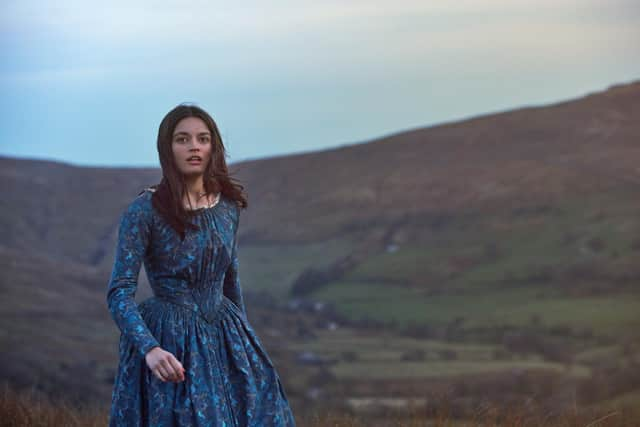A look back at some of the highlights of the past year in film
The year opened strongly with the release in January of Kenneth Branagh’s latest film as writer-director, Belfast, an affectionate, luminously beautiful black and white tribute to the place of his birth and early childhood. With a stellar cast, including Jamie Dornan, Judi Dench and Ciarán Hinds, and set in Belfast in the late 1960s just as the underlying violence and sectarianism in Northern Ireland reach a tipping point, it tells the story of young Buddy (a lovely performance from newcomer Jude Hill) and his family who have a big decision to make about whether to stay in Belfast or move to England to begin a new life there. Warm, tender and at times incredibly moving, it is Branagh’s most personal film to date.
There were two notable Yorkshire-inspired films – Clio Barnard’s brilliant Ali & Ava, released in March, and actor-turned-director Frances O’Connor’s impressive debut Emily, which came out in the autumn. Yorkshire filmmaker Barnard’s latest film is set, like two of her previous movies, in Bradford and is an affecting story of finding love later in life that also explores themes of race, religion and class. Adeel Akhtar and Claire Rushbrook both give wonderful, authentic performances as the title characters and there is a sweet, natural chemistry between them. Ava is a widow whose late husband was a bully and a racist, Ali is trapped in a marriage that is over but that he and his wife don’t know quite how to end. Ava is a teaching assistant, a mother and grandmother; Ali is a landlord and would-be DJ and musician. As their relationship grows, they face resistance from those close to them. The film is a moving celebration of love and acceptance.
Advertisement
Hide AdAdvertisement
Hide AdWriter-director O’Connor’s Emily, released in October, focusses on a specific period in the life of Emily Brontë and imagines a love affair between her and her father’s curate which the film suggests was a template for the turbulent relationship between Catherine Earnshaw and Heathcliff is Emily’s seminal novel Wuthering Heights. This upset some of the Brontë purists – and O’Connor was aware that it would – but if you accept the movie as a work of imagination, it is a very accomplished piece of cinema. Filmed on location around Haworth, it makes the most of the rugged landscape, powerfully conveying Emily’s profound relationship with it. And in the title role Emma Mackey is just perfect. Also released in October was The Banshees of Inisherin, a dark comedy set in the 1920s on an island off the coast of Ireland, telling the story of a fractured friendship and laced with writer-director Martin McDonagh’s characteristic flourishes. It once again teamed Brendan Gleeson and Colin Farrell who co-starred in McDonagh’s hit move In Bruges, this time as old friends whose relationship comes to an abrupt end when one of them declares “I just don’t like you anymore.” Gleeson and Farrell play off against each other brilliantly in a compelling study of male pride and wounded feelings.


Big American movies released this year included the long-awaited Top Gun: Maverick which appeared in May, with Tom Cruise reprising his role as Pete ‘Maverick’ Mitchell, most critics gave it positive reviews and audiences clearly loved it as it became the highest grossing US film of the year. In June, Baz Luhrmann’s Elvis was a deserved hit, giving a different twist on the Presley biopic with a very fine central performance from Austin Butler as the King; and the bonus of a cast-against-type opportunity for Tom Hanks as Elvis’s controlling manager Colonel Tom Parker.
A quirky surprise came along in September in the form of Lena Denham’s Catherine Called Birdy. Directed and scripted by Denham, adapted from Karen Cushman’s young adult novel, it’s a wonderful romp set in 13th century Lincolnshire, telling the coming-of-age story of Catherine, the only daughter of Lord Rollo – and a lively young heroine of the first order. At the age of 14 she is on the cusp of womanhood and her father is looking to marry her off in order to settle his ever-growing debts. As a line of horribly unsuitable suitors come to call, Birdy finds ingenious ways to put them off, but she can’t escape her fate forever. Bella Ramsey is excellent as Catherine (or Birdy) and Denham’s script is the perfect blend of laugh-out-loud humour, feisty feminist polemic and sharp emotional intelligence.
Finally, also released in September and worthy of note is Moonage Daydream, filmmaker Brett Morgan’s celebration of the life and work of David Bowie. It is an amazingly rich, textured and layered documentary that combines archive clips of Bowie being interviewed at various points in his career with footage of live performance, film and stage roles, and segments from Bowie’s own experimental video art. It delighted those who were already fans and introduced others to an extraordinarily talented and complex human. A man truly ahead of his time.